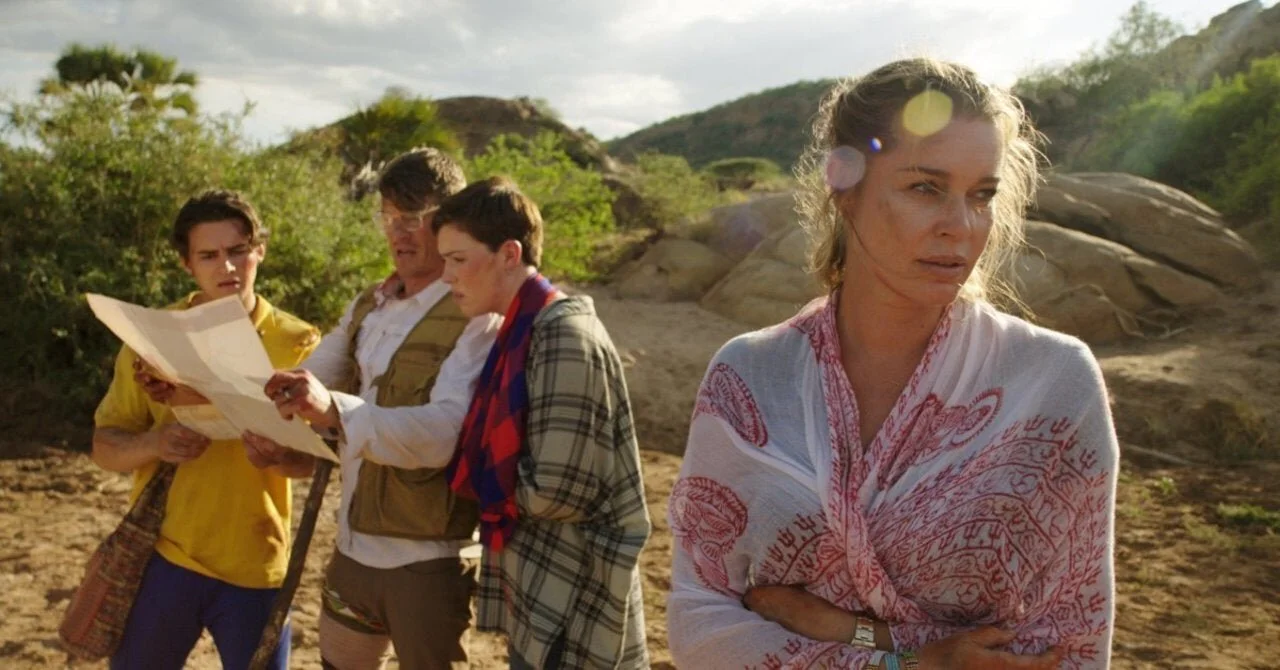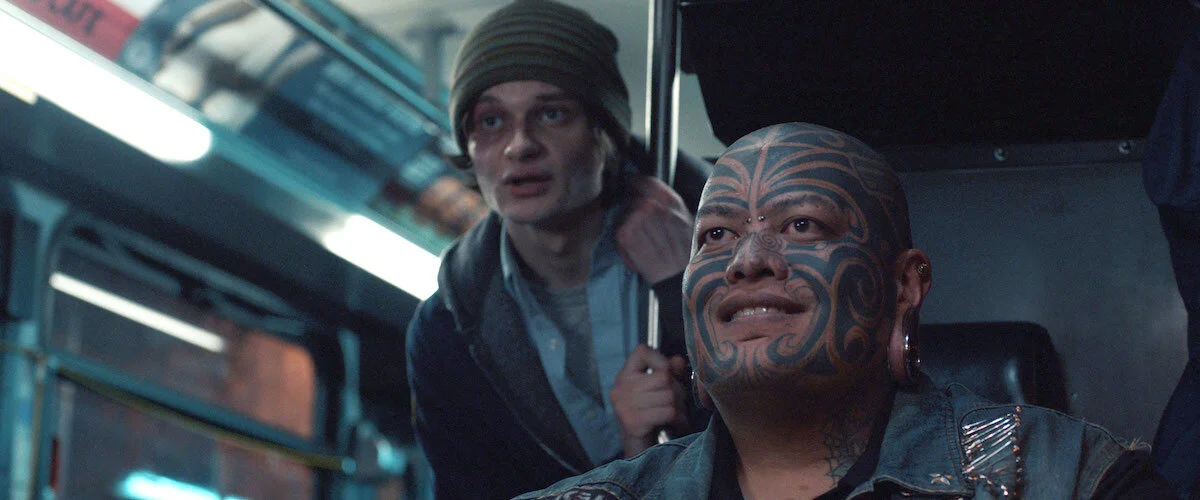Endangered Species (2021)
The Nuclear Bomb Family
It’s tempting to view M.J. Bassett’s Endangered Species as Lionsgate’s attempt to cash in on wokeness. The trailer shows a scrawny, sweaty, mid-level executive-type going on safari with a brood that treats him like the pathetic nerd he appears to be. We’re presented with the shaved-head rebellious teenage daughter who despises her own privilege; her new-century hippie boyfriend; a younger brother who’s probably gay; and a mother who wears the pants in the family (even if they look like shorts).
I don’t have a problem with shaved-head girls, gay teens, hippies, or strong women. I am, however, growing tired of the doofus-dad archetype in entertainment that incongruously presents straight White males as both hopelessly incapable and as oppressive bullies that have ruined the planet, society, culture, fashion, etc. Pop culture dads have devolved from fonts of wisdom to sputtering faucets of lameness who constantly need to be put in their place—however ill-defined that place may be.
Oddly enough, this phenomenon transcends race, but still falls under the rubric of “Whiteness”. Go figure.
If you think I’m reading too much into this film’s politics, consider the following lines of dialogue, aimed (directly and indirectly) at Halsey family patriarch, Jack (Philip Winchester): “Old white men in suits are fucking everything up for us”, and “Violence, corruption, child labor—all for [cellphone cobalt]”.
Endangered Species’ surface themes are so on the nose they might as well be zits. Luckily, Bassett (and co-writers Paul Chronnell and Isabel Bassett—the director’s daughter, who also plays Jack’s daughter, Zoe) are interested in more than a run-of-the-mill Colonizer Comeuppance story. Which is to say there is some cosmic justice for Exxon exec Jack, but the rest of the family learns some ugly truths about the progressive American bubbles from inside which they’ve been joyfully, judgmentally bouncing off of Dad.
From minute one, things go wrong for the Halseys. Their flight into Kenya is choppy. The truck they’ve rented to tour Amboseli National Park turns out to be a junker (“I asked for a Mercedes”, Jack grouses to a smirking tour guide). Zoe insists on bringing glass water bottles on the trip—all of which shatter when the family’s transport is charged by a rhino after Jack crashes a security gate in order to disprove his play-it-safe reputation.
Also made of glass: the insulin vials that would’ve been nice to have as diabetic mom Lauren (Rebecca Romijn) struggles beneath the harsh sun. Before long, the group has split up and run afoul of a leopard, ravenous hyenas, and eventually a team of poachers and their ruthless leader—the truly evil imperialist capitalist that Zoe probably thought her father was until coming face-to-muzzle with the real thing.
I won’t spoil any more details of the Hawleys’ ordeal. The trailer already did that—including what is, in context, a truly hand-to-mouth shocker that I’m embarrassed to say made me jump. Bassett and company have put together a very effective and lushly shot little thriller, one that saves the more contrived intrigue-plot elements for the last act and instead relies on the primal fear of helplessness in the face of nature to carry much of the story.
What makes the film a must-watch, though, is the deconstructing of the archetypes I listed at the beginning of this review. The film’s title obviously refers to the animals that Mitch and his crew of locals hunt, slice, and sell on the black market. But it also suggests that the nuclear family, as represented by the Halseys, is also in danger of going extinct. Yes, families come in all shapes, sizes, dynamics, etc. But there’s something elemental about these squabbling, disconnected suburbanites that feels in urgent need of redemption.
For much of the movie, Jack is the stand-in for Friday the 13th’s Crazy Ralph—the character who warns everyone to follow common sense in the face of very obvious peril. The problem is, any authority he might exert at his job is completely undermined by the people that don’t work for him (as well as his own pride). He refuses to acknowledge his discomfort with the idea of his son, Noah (Michael Johnston), having a boyfriend, even though everyone else can see it. He petulantly threatens to cut off his daughter’s cell phone and cancel her summer concert tickets when Zoe gives him attitude.
Fueled by fist-clenching insecurity, Jack Halsey is a model of impotent middle-management rage—which makes him exactly the wrong messenger for good ideas, such as bringing plastic water bottles on the trip, staying together instead of splitting up, and not mouthing off to the heavily armed poachers when there was still a hope in playing dumb. He’s far from blameless, though. He lacked the courage to tell his family that troubles at work had put their vacation in jeopardy before they even boarded the plane. Another representation of the fear of losing everything (from money to control) that can accompany wealth and status.
Lauren embodies this hubris, too, in her playful put-downs of Jack’s airsickness; unquestioning support of the eco-responsible glass water bottles; and insistence on taking photos of a wild rhino up close without any armed protection or professional guidance. It’s as if she’d imported the safety of her Nature Channel binge-watches into actual nature, completely ignorant of the real potential harm in every bad decision. And she’s a doctor!
The filmmakers take great pains to beat the hell out of all these people. Not everyone survives this carefree getaway, and the ones who do will be scarred for life (in both senses of the word). Endangered Species isn’t elevated torture porn, though. Pay attention to each character’s arc and notice how the filmmakers don’t settle for just having weak characters become action heroes or ostensibly strong characters get knocked down several pegs by the elements.
Their assumptions about the world are tested, too. In a remarkable exchange, Jack and the head poacher debate the ethics of each of their jobs. Yes, the poacher may cut the horns off of rhinos so that guys like Jack can decorate their dens—but what kind of damage do guys like Jack do from those dens, with a few strokes of the keyboard or a conference call?
I was genuinely floored when two of the most obnoxious characters at the outset wound up becoming the people I most rooted for in the climax. One, in particular, evolved from an attitude of “life being over” if they were denied certain luxuries to unleashing reserves of strength and rage at the prospect of their life actually ending. There are also some hefty revelations about this character, and the greater family dynamic, that helped me understand how deep their fractures run, and how much more important it should have been for Jack and Lauren to spend more time understanding their kids than saving up for a trip they had no business going on.
“Ian,” you’re thinking. Isn’t this the Lionsgate movie with the horrible-looking CGI animals and Jerry O’Connell hammily declaring, “Welcome to the jungle”? Where is all this Petersonian nonsense coming from?
First, yes, the creatures in the film often look rather dodgy. I’d like to point out, though, that principal photography took place about six months prior to the release of the film, during the pandemic—meaning a lot of the digital effects were likely done remotely, by separate teams, without the financial backing or hands-on guidance of a mega studio, like Disney. Second, I’ve seen Cruella, a movie that proves you can throw all the money in the world at creating photo-real CGI dogs and still find yourself buried alive in the uncanny valley.
And while I’ve spent countless pixels decrying the iffy output of Lionsgate over the years, I’m not too proud to admit when they get something right. Endangered Species is far from perfect. It’s a solid, intermittently invigorating cautionary tale with more on its mind than pretty pictures and environmentalist bumper sticker messaging.
Watch my interview with star Philip Winchester on the Kicking the Seat YouTube channel.





